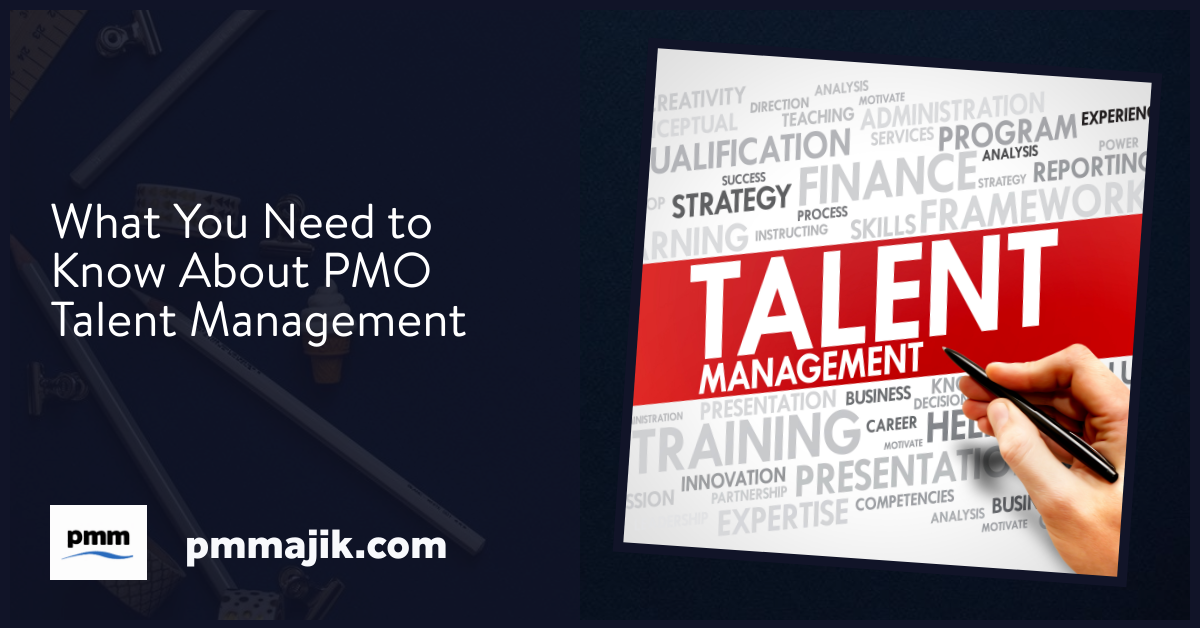Having the right talent in your project management office (PMO) and working on your projects will dictate the success of the work you do. With the changing landscape of the labour market, we’re going to explore what you need to know about PMO talent management.
Talent in your projects will drive change, and successfully delivered change is the end goal of most if not all PMOs. Skilled people who can effectively deliver results are the best investment you can make for your projects, yet talent management is a significant challenge.
To help you navigate talent management in your PMO, we’re going to look at:
- What talent management is
- What good talent looks like for a PMO
- The characteristics of good PMO talent management
- How to understand and respond to your PMO talent needs
We’ll also be diving deeper into each topic in the next series of blogs for you.
What is PMO talent management?
Talent management is the process of working with the people within your PMO to give them the right training for the job and to get the best work from them. There are four phases of talent management, namely:
- Understanding your PMO’s talent needs
- Acquiring the talent needed
- Developing the talent to be effective
- Retaining the talent and avoiding turnover
Every organisation will be slightly different in how your PMO will interact with the HR department in these stages. Indeed, this is one of the main challenges of talent management, which include:
- Partnerships within the business, such as HR, to drive talent acquisition and retention
- The overall availability of suitable talent in the accessible labour markets
- Support from the C-suite and project sponsor to give priority and budget for PMO talent
What makes a good project manager?
To attract the best talent to work within and around your PMO, you need to understand what a good team member will look like. A project manager will be the driving force within a project to get it delivered on time and on budget.
We’ll explore what makes a great project manager in a coming article, but the main things you want to look for are:
- Leadership skills and the ability to give direction
- Organisational skills to manage all the moving parts
- Technical project knowledge to understand timeframes and challenges
- Experience in your chosen project methodology
Of course, elements such as cultural fit and industry experience will also be important – someone from start-up culture could have a tough time moving into a multinational and vice versa.
What does good PMO talent management look like?
In a recent PMI report, six characteristics of good talent management were recognised. Businesses with good talent management practices that aligned with the business strategy saw project success rates of 72 percent compared to those without strong strategic alignment achieving 58 percent project success rates.
The six elements of successful PMO talent management are:
- Being able to transfer talent from the current to the next project effectively
- Being prepared to bring in new talent when the PMO is ready for it
- Having a strong succession plan in place across the business
- Linking career advancement with the business’ succession planning
- Encouraging leaders in the business to adopt and continue to use data and analytics
- Investing in HR technologies and processes
While some of these may seem to be out of scope for your PMO, you can certainly work to achieve them in the wider business.
How do I know the talent my PMO needs?
Resource planning is something a good PMO will know how to do. It isn’t all about headcount, though – you need to make sure you’re nurturing the people working on projects. Offering professional development in line with projected business needs is important, for example.
You will also need to work with the HR team and make sure they are prepared and ready to bring in the talent that you need, as well.
PMO talent management
Good talent management will ensure the long-term success of your PMO and the business you function in. We’ve given you an overview of what you need to know about PMO talent management and will be getting deeper into the topics in the coming articles.






